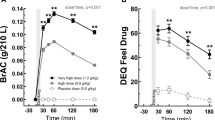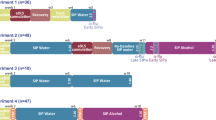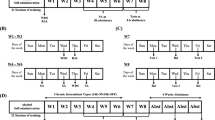Abstract
EARLIER experiments in our laboratories1 with animals on a free choice between water and an ethyl alcohol solution have indicated that the amount of alcohol consumed relative to the total fluid intake, the so-called alcohol preference, is influenced by the water requirement of the animal and by its ability to metabolize alcohol. This means that the absolute amount of alcohol per unit of body weight remains unchanged when the concentration of the alcohol solution is changed. On the other hand, an increasing water requirement may change the calculated alcohol preference, even if the absolute amount of alcohol remains unchanged.
This is a preview of subscription content, access via your institution
Access options
Subscribe to this journal
Receive 51 print issues and online access
$199.00 per year
only $3.90 per issue
Buy this article
- Purchase on Springer Link
- Instant access to full article PDF
Prices may be subject to local taxes which are calculated during checkout
Similar content being viewed by others
References
Arvola, A., and Forsander, O., Quart. J. Studies Alc., 24, 591 (1963).
Parisella, R. M., and Pritham, G. H., Quart. J. Studies Alc., 25, 248 (1964).
Wallgren, H., and Forsander, O., Brit. J. Nutrit. 17, 453 (1963).
Author information
Authors and Affiliations
Rights and permissions
About this article
Cite this article
ERIKSSON, K. Effect of Two Diuretic Drugs on Liquid Consumption and Free Choice of Alcohol in Albino Rats. Nature 213, 316–317 (1967). https://doi.org/10.1038/213316a0
Issue Date:
DOI: https://doi.org/10.1038/213316a0
Comments
By submitting a comment you agree to abide by our Terms and Community Guidelines. If you find something abusive or that does not comply with our terms or guidelines please flag it as inappropriate.



